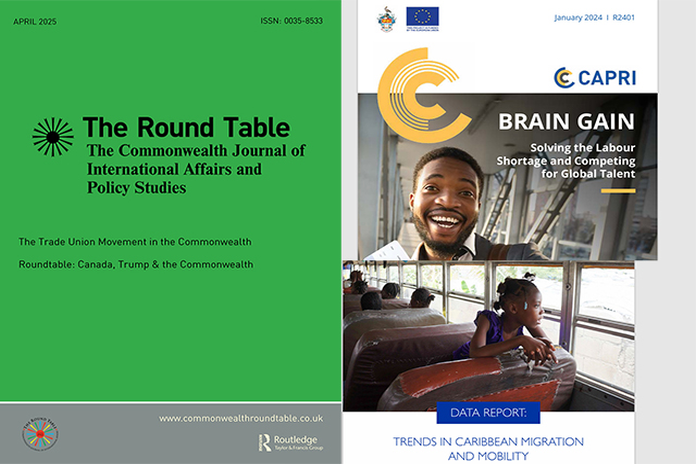By David R. Salmon
The English-speaking Caribbean has been characterised by sluggish growth, high unemployment, low productivity, significant emigration and an overreliance on services (ECLAC, Citation2024, p. 24).
Trinidad and Tobago and Guyana are notable exceptions as their hydrocarbon-based economies make them outliers in a region dominated by services. Nevertheless, they also share some characteristics of the Caribbean’s development experience including high emigration (IOM, Citation2023, p. 13).
These conditions mirror the situation Arthur Lewis described in his early publications. In his 1954 thesis, Lewis outlines a dual sector economy where a large number of workers in the ‘subsistence sector’ are engaged in informal activities such as small-scale agriculture, domestic services and trading. Augmented by population growth, the sector has surplus labour and is plagued by low productivity (Lewis, Citation1954, p. 147).
Conversely, the ‘capitalist sector’ is geared towards profit maximisation using labour and capital (Lewis, Citation1954, p. 189). Lewis advocated for this sector’s expansion, through industrialisation, to absorb excess labour from the informal sector,Footnote1 reduce unemployment and increase economic growth (Lewis, Citation1955, p. 341). In describing Lewis’ work, it is important to acknowledge that at the time, the two major schools of thought that influenced economic debate was the Keynesian and Classical Schools.
The Keynesian School argued that aggregate demand is the major factor that influences economic growth while the Classical School advanced that the major variable was supply. Lewis fits into this analysis as he argues that demand for goods in the capitalist sector drives growth. Notwithstanding this, supply constraints in the subsistence sector can impair performance.
David R. Salmon wins the 2024 Harry Hodson Prize
Round Table Journal notices, including award news
Seventy years after Lewis made his groundbreaking contribution, the features of the region’s labour force have dramatically changed. In 2023, population growth slowed to 0.37 percent and from 2038 the Caribbean’s population will start to decline (Jones, Citation2024, p. 11).
In Jamaica’s case, 745,289 people emigrated to the United States, Canada and the United Kingdom between 1970 and 2003. On average, this equates to 21,920 Jamaicans per annum (Parkins, Citation2010, p. 8). These migrants are typically of working age, which impacts the composition and size of the labour force. As a result, Jamaica is currently experiencing a shortage of workers, especially skilled labour (CAPRI, Citation2024). Even though Lewis initially advocated for a developmental model fuelled by labour-intensive industries, the country’s shrinking workforce has increasingly strained the efficacy of this approach.
This raises the question: how can economic development be achieved given Jamaica’s limited supply of labour? Tackling this issue is critical as Jamaica’s annual GDP growth has averaged only 1% over the last 30 years (Haughton & Ivey, Citation2023, p. 229).
To answer this question, this essay will explore how the findings from Lewis’ work can address two leviathans that have plagued the island’s development: limited productivity and economic stagnation. Rather than dismiss Lewis’ prognosis as anachronistic, this essay posits that his recommendations of improving agricultural productivity and creating new industries remain relevant and timely despite Jamaica’s changing labour market characteristics.
David R. Salmon is with the Oxford Department of International Development, University of Oxford, UK.
[This is an excerpt from an article in The Round Table: The Commonwealth Journal of International Affairs and Policy Studies.]





